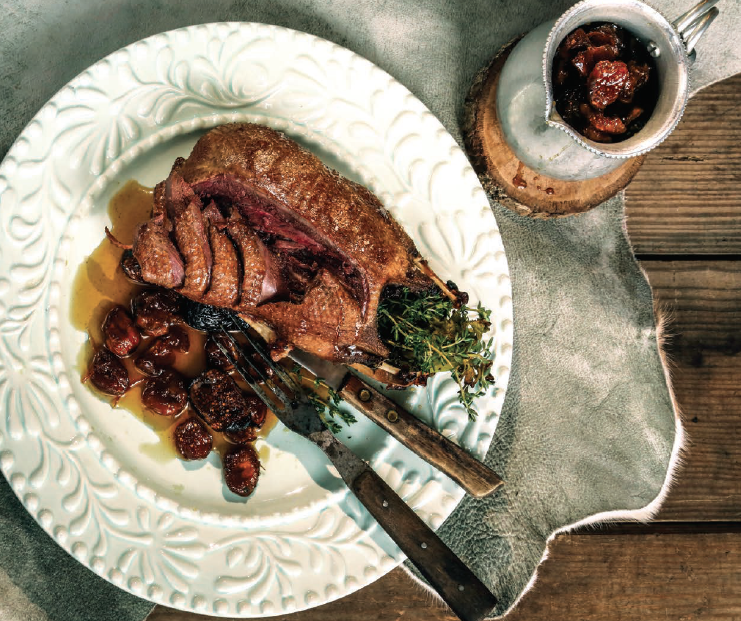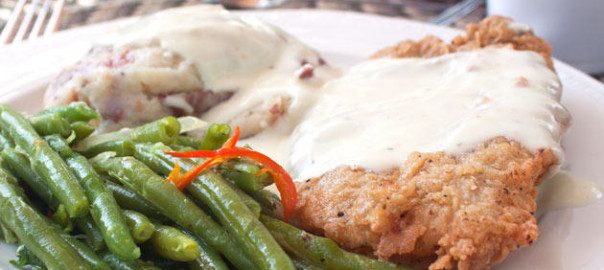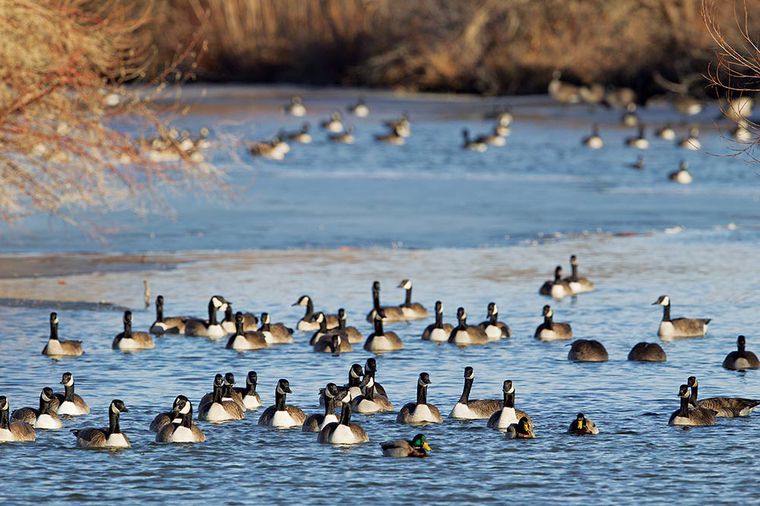Whole plucked and roasted ducks make for a lovely presentation—especially a single teal per person, which is just right for a dinner plate.
For the Brine
- 1 cup kosher salt
- 1 cup organic cane sugar
- 1 tablespoon whole black peppercorns, crushed
- 4 allspice berries, crushed
- 6 juniper berries, crushed
- 6 sprigs fresh thyme
- 2 bay leaves, crumbled
For the Ducks
- 4 teal, or 2 large ducks, cleaned and plucked
- 8 stalks celery, cut into thirds
- 1/2 cup (1 stick) unsalted butter, at room temperature
- Sea salt
- Freshly ground black pepper
- 12 sprigs fresh thyme
- *1 (1/2 pint) jar honeyed figs (see recipe)
Two days ahead of roasting, make the brine. Combine the brine ingredients in a 5-quart stockpot and add 1 gallon (16 cups) water. Bring to a boil over high heat, then lower the heat to medium and simmer for 20 minutes. Remove from the heat and let cool to room temperature.
Line a small (9-quart) cooler with a food grade plastic bag, place the teal in the bag and pour the brine over them. Squeeze any air pockets out of the bag and tie it securely. Cover with a layer of ice and let sit for 24 hours.
The next day, remove the ducks from the brine and place them on a wire rack over a baking sheet. Pat dry with paper towels, set on a rack over a drip pan and dry-age in the refrigerator for 24 hours. (For larger ducks, you may double both the brining time and the dry-aging time).
Preheat the oven to 500° F.
On a large baking sheet, arrange the celery sticks as little racks to hold the ducks, breast up, above the surface of the pan. Butter the ducks inside and out and season with salt and pepper. Insert the thyme sprigs and any remaining celery in the cavity and roast—10 minutes for the teal, 15 to 18 minutes for the larger ducks.
Remove from the oven, tent loosely with foil and let sit for 5 minutes before serving.
While the ducks are resting, warm (but not boil) the honeyed figs in a small saucepan.
Honeyed Figs
- 4 1/2 to 5 pounds figs
- 1/4 cup coarse organic cane sugar
- 1 1/2 cups local honey
- Juice and grated zest of 1 lemon
Slice figs in half lengthwise and place cut side up on a baking sheet lined with parchment. Sprinkle with the sugar and dry in a 170° F oven until leathery (about 4 hours).
Prepare a water-bath canner and bring it to a simmer (180° F) over medium heat. Heat 8 (1/2 pint) jelly jars in the canner, either upside down or on their sides. In a saucepan, add enough water to cover the lids and bands, bring to a simmer (180° F) over medium heat; do not boil.
Keep lids hot until you’re ready to apply them.
Bring the honey to a boil over medium-high heat, remove from the heat and stir in the lemon juice and zest.
When the water in the canner begins to simmer, use tongs to remove the jars. Loosely pack the figs into the hot jars, then ladle the hot honey into the jars, leaving 1/4-inch headspace. Using a bubble remover or plastic utensil, remove any air bubbles, then wipe the jar rims clean and apply the lids and bands. Return the jars to the canner with enough water to cover the tops of the jars by 1 inch. Bring to a boil and process for 10 minutes. Uncover the canner and turn off the heat. After 5 minutes remove the jars and let them cool. Allow the jars to cool to room temperature, check the seals, remove the bands and store in a cool, dry place for up to a year. Yields 7 to 8 (1/2-pint) jars.
This recipe was originally published in the Field to Table Cookbook by Susan S. Ebert.
 Within the pages of The Ultimate Guide to Cooking Wild Game, twenty-five popular game animals are highlighted and discussed. Amateur and experienced hunters alike will enjoy learning about each animal’s origin, range, migration and travel patterns, life span, size and weight, typical habitat, desired foods, why the particular animal is targeted, where it can be hunted, along with hunting tips and why it makes for excellent table fare.
Within the pages of The Ultimate Guide to Cooking Wild Game, twenty-five popular game animals are highlighted and discussed. Amateur and experienced hunters alike will enjoy learning about each animal’s origin, range, migration and travel patterns, life span, size and weight, typical habitat, desired foods, why the particular animal is targeted, where it can be hunted, along with hunting tips and why it makes for excellent table fare.
Whether you hunt for food, for pleasure, or for environmental management, know that you are engaging in a normal, natural, and innate human instinct that has been with mankind and our predecessors for hundreds of thousands of years and one that will be with us for many more years to come. Enjoy the hunt, and the tastes and flavors of your successes with a little help from this new book! Buy Now




